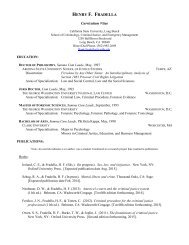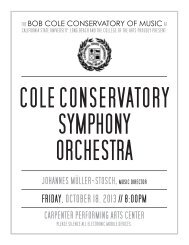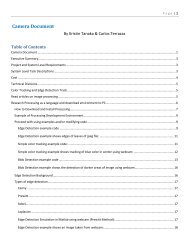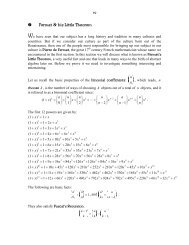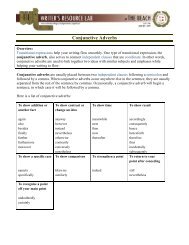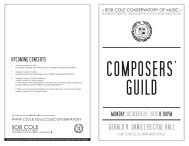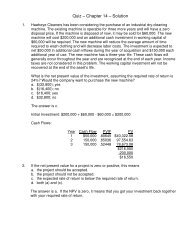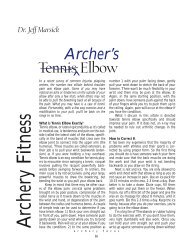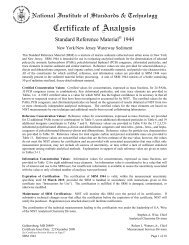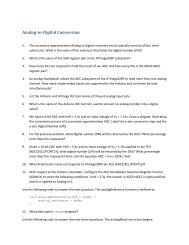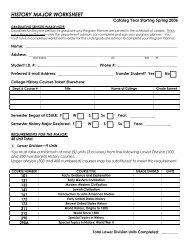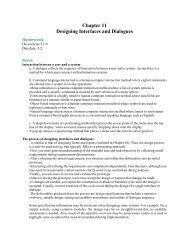Untitled - California State University, Long Beach
Untitled - California State University, Long Beach
Untitled - California State University, Long Beach
Create successful ePaper yourself
Turn your PDF publications into a flip-book with our unique Google optimized e-Paper software.
Ongenþeow are presented to us as peace-keepers who are focused on the<br />
preservation of their communities, Beowulf falls well short of the mark.<br />
Beowulf continually disregards the tenets of community, especially the<br />
acknowledgement of his matrilineal relationships and refusal to provide<br />
for his people a queen, instead focusing on his own glory-building and<br />
quests for treasure. Robert Morey points out that Beowulf seems “married<br />
to the eorlscipe he enacts among the Danes” (493). While Morey argues<br />
this due to the fact that Beowulf is feminized in the narrative, I would<br />
argue that it is because Beowulf is more devoted to causes outside his<br />
home-tribe (we see no act on Beowulf’s behalf comparable to his battle<br />
with Grendel, which restores peace in the Danish community, even as his<br />
own people suffer with increasing feudal wars), rather than focusing on<br />
the necessary community building efforts within his own people due to a<br />
lack of regard for his mother’s kin. Wiglaf, Beowulf’s trusted companion,<br />
delivers a speech that allows us to see Beowulf’s decision making process<br />
at the end of his life:<br />
‘Oft sceall eorl monig anes willan<br />
wræc adreogan, swa us geworden is.<br />
Ne meahton we gelæron leofne þeoden,<br />
rices hyrde ræd ænigne,<br />
þaet he ne grette goldweard þone,<br />
lete hyne licgean þær he longe wæs,<br />
wicum wunian oð woruldene;<br />
heold on heahgesceap. Hord ys gesceawod. (3075-3084)<br />
[Often many men shall endure misery / for the will of one, so<br />
became us. / We could not teach or advise our well-loved king,<br />
/ by not any counsel the guardian of the realm / that he might<br />
not attack the guardian of the gold / might allow him to lie<br />
low where he long was / to reside in settlement as far as the end<br />
of the world, / Guarded in destiny. What is hidden, hoard, is<br />
72 | Sevi<br />
viewed.]<br />
Wiglaf in no uncertain terms claims that Beowulf’s decision to go against<br />
the dragon was selfish. Beowulf refuses to take the counsel of his men and<br />
leaves them in “wræc” [misery], in pursuit of his own “willan” [will or<br />
desire]. His thanes prove unworthy substitutes for the counsel of a queen;<br />
with the lack of a queen to advise him properly, Beowulf focuses on<br />
seeking glory for himself rather than worrying about his people who are<br />
torn apart by his decisions and by his unwillingness to be advised. When<br />
faced with the dragon, Beowulf’s thoughts are not with his community;<br />
rather, his focus is on fitting into the warrior mode he envisions for<br />
himself and gaining treasure: “eorscype efne. Ic mid elne dæle / gold<br />
gegangan” [I must perform this warriorly deed. I with strength shall gain<br />
gold] (2534-2535). In contrast, when Grendel attacks Heorot, Hroþgar<br />
does not himself descend into battle against Grendel. Putting himself<br />
directly into harm’s way while his kingdom’s future is not certain (in that<br />
both of his sons are too young to claim the throne and his community<br />
would therefore be put into disarray over a fight for the throne) is not<br />
how a king excels. Similarly, Ongenþeow only descends into battle as<br />
a last resort to save his people from certain extinction. Beowulf’s own<br />
kingdom is in similar turmoil, given that the death of Beowulf will<br />
almost certainly mean invasion by the Swedish. With no heir left behind,<br />
thereby destroying his mother’s bloodline that has ruled the Geats for<br />
several generations, the Geats have no stable, established leader to turn to<br />
for protection. Beowulf reflects on his lack of an heir after being mortally<br />
wounded:<br />
Nu ic suna minum syllan wolde<br />
guðgewædu, þær me gifeðe swa<br />
ænig yrfeweard æfter wurde<br />
lice gelenge. Ic ðas leode heold<br />
fiftig wintra; næs se folccyning,<br />
Sevi | 73



